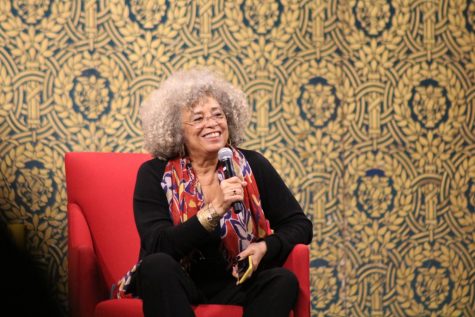An Angela Davis Experience
February 10, 2020

In honor of Black History Month and the unforgettable Dr. Martin Luther King, Angela Davis graced Yale University’s Woolsey Hall, where she discussed topics of today’s modern-day overshadowed struggles such as mass incarceration, prison abolition, and the economic structure of our society.
Davis is well-known for her iconic activist role in the Black Panther Party in the 1960s and ’70s and is a former member of the Communist Party, where she fought against the same issue that still dominates today: discrimination.
Discrimination is defined as the “unjust prejudicial treatment of different categories of people or things, especially on the grounds of race, age or sex,” according to the Google dictionary. Yet, anyone who is considered a minority must be mentally prepared to face the possibility that they might be discriminated against, despite their character or beliefs.
Although Davis touched on the key that has been missing all along, saying that “we cannot focus on racism alone; we have to think about the economic structure of our society,” the truth is, the economic structure of our society is crumbling.
America is primarily a market-oriented economy where private individuals and business firms make most of the decisions, while our state and federal governments buy our needed goods from the same private marketplace.
“In 1963, the average wealth of white families was $121,000 higher than the average wealth of nonwhite families. By 2016, the average wealth of white families ($919,000) was over $700,000 higher than the average wealth of black families ($140,000) and of Hispanic families ($192,000),” states the Urban Institute calculation from the Survey of Changes in Family Finances in 1963, and Survey of Consumer Finances from 1983 to 2016.
How could one succeed when the only ones with the key to unlock change for the economy are the same ones who have created the infrastructure we are trying to escape?
Minorities are still fighting the battle of not only racism, but the prison system as well, as if the odds are constantly stacked against them with no room for success — especially for a man.
According to a 2017 study by the Pew Research Center, “there were 1,549 black prisoners for every 100,000 black adults – nearly six times the imprisonment rate for whites (272 per 100,000) and nearly double the rate for Hispanics (823 per 100,000).”
“People of African descent in the Americas have embodied the quest for freedom for five long centuries,” said Davis.
Still, we are all fighting the same war 500 years later; and it is no longer an African American war, it is just an American war.
Activists like Davis, King, Malcolm X and many more put their lives on the line for the change that should be evident in our society today. But now we have youth like Trayvon Martin, Eric Garner and Oscar Grant who suffered from the cause that has been claimed to have disappeared or declined, but truthfully it has only moved into a more protected atmosphere: our government and institutions.
While Davis’s new silver Afro stood strong, her words of systematic change spoke volumes to the multi-colored crowd that filled Woolsey Hall to its full capacity — telling the solutions to the problems that we are facing today and the mishaps of the past that can shape our future.
“It is important to recognize how much black movements have transformed — the cry for black power emerged from a specific set of conditions. It was largely an effort to acknowledge the breadth of the movement,” said Davis.
Those specific set of conditions Davis mentioned (prison abolition, economic structure, and racism) are still prevalent today and will not disappear by tomorrow, but the way we go about it this time can cause everlasting change and possibly stop the reversing decline of our cultures.
“You can’t just bring down an institution and it’ll be fine. We must recognize the way we ourselves bear the impact of those institutions,” said Davis.
Near the end of her keynote speaking, she disclosed an unheard opinion that many wouldn’t have assumed: her disapproval of black capitalism and assimilation — the end goal is peaceful unity for all — in hopes that won’t take another five centuries.
“But I would also say Mississippi Goddamn,” Davis closes with an angelic smile.



